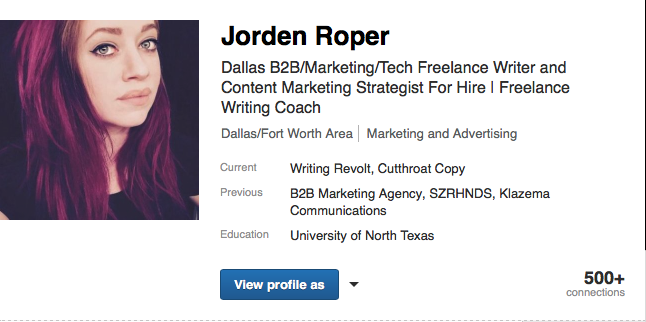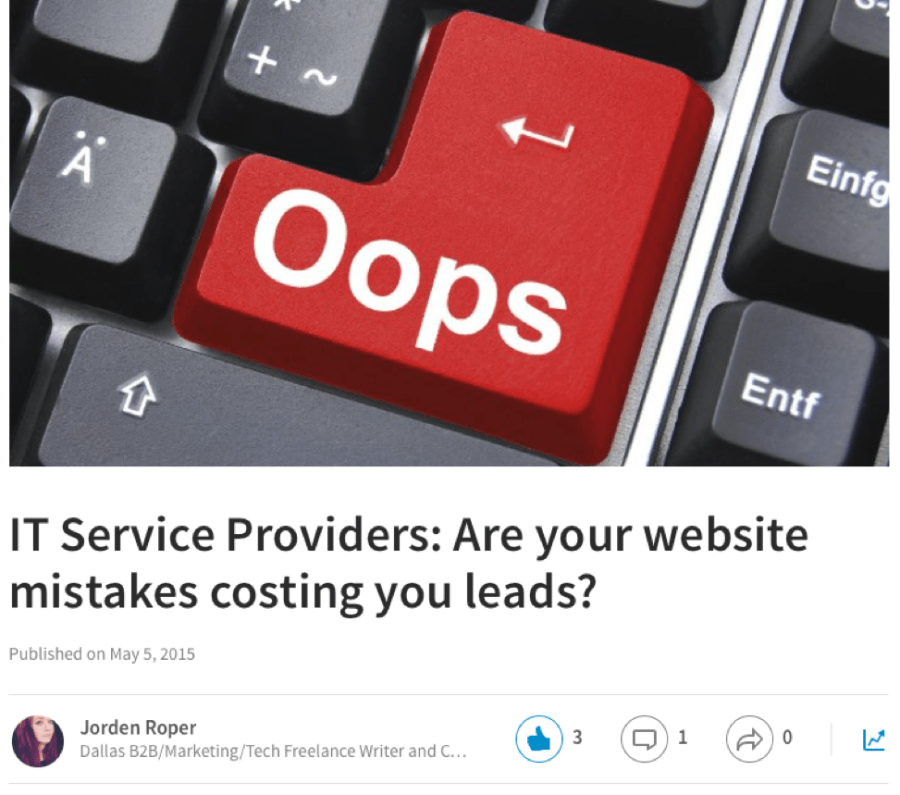So, you want to learn how to start freelance writing with no experience, huh?
If you’ve already looked into it, you’ve probably heard that a good place to start is one of the following shitty places:
- Upwork – A race to the bottom where you have to give a huge chunk of your earnings back to the site.
- Content mills – Get treated like crap, get paid like crap, and end up making less than minimum wage… FUN.
- Fiverr – Five bucks for a specialized skill AND putting up with the insane demands of these type of clients? It’s a no from me.
I think you get where I’m going with this…
Those kinds of sites are the FUCKING worst.
I mean, more often than not, you barely get paid anything, you don’t get any real experience working with clients, and when you bid on work, you have to race to the bottom and compete on price.
Not good.
With that in mind, you might be thinking:
I mean, doesn’t everyone start somewhere?
And how the heck else am I supposed to find freelance writing clients as a total newbie?
Well, everyone DOES start somewhere.
…But that somewhere doesn’t have to be a shitty bidding site where you end up getting paid less than minimum wage for your work.
That’s right – you can totally jump right in and land clients on your own, like I did when I quickly made my first $1,000 freelance writing and then built a $5,000/mo freelance writing business within just 4 months of getting fired from my soul-sucking job.
Let’s talk about exactly how to become a freelance writer when you have no experience – the same process I used when I started out and built my business to $5K/mo in 4 months.
How to Become a Freelance Writer with NO Experience
Step 1: Think like a business owner, not a desperate employee.
Look – I get that this doesn’t seem like all that practical of a step.
BUT IT IS.
Your mindset literally impacts EVERYTHING you do to market yourself.
And we’ll get to exactly how to market yourself in a minute. But you MUST understand how to master your mindset first.
Here are 3 of the most important mindset shifts you need to make to avoid failure as a freelance writer:
- Stop thinking like a desperate employee and putting clients on a pedestal. Seriously, clients can smell desperation from a mile away, and the shady ones will use that to underpay you and overwork you. Remember, you’re not an employee asking for a job, you’re a businessperson starting a mutually beneficial relationship with another businessperson.
- Realize that you’re going to have to invest time and money. You’ve gotta spend money to make money. Fortunately, freelance writing is a super low-cost business to start and run. You just need a domain/hosting for your website, and maybe a few good courses if you don’t know how to write for the web and market yourself.
- Understand that you’re not going to do everything perfectly, and give yourself permission to screw up sometimes. I’ve seen beginner writers stress SOOOO much over decisions (like picking a niche) that they end up never taking action at all. That’s right – months of stressing and perfectionism and they end up in the same exact place due to fear. Don’t be that writer! You will make MAJOR mistakes sometimes. That’s just business, baby.
Basically all of these mindset shifts come down to one thing:
Developing a business owner mindset.
And like I said, this has a huge impact on the more practical parts of your marketing.
For example…
Say you go to write a pitch or cold email. You aren’t confident and you don’t see yourself like a business owner.
So, you end up putting a bunch of unconfident language in your pitches that throw up red flags to your potential clients. As a result, you get no clients whatsoever from your pitching…
ALL because you started out with the wrong mindset!
On the other hand, when you pitch like a confident business owner (and maybe even take a course one how to pitch and cold email, since that can totally speed up your client-getting process x10, just sayin’), you get RESPECTED and taken seriously by clients.
And that gives you a much better shot at getting hired!
Step 2: Pick a niche.
Alright, now that you’ve got your mind right, the first thing you want to do is pick a freelance writing niche.
“Niche” is just a fancy-schmancy word that means your area of specialty.
You can niche down one of three ways:
- Type of content – Case Studies, Blog Posts, Whitepapers, etc.
- Industry/topic – Finance, Tech, Lifestyle, etc.
- Type of content AND industry/topic – Finance Blog Posts, Tech Case Studies, etc.
For example, my main niche is writing B2B blog posts about marketing topics.
So, that’s how I market myself everywhere online – as a “B2B and Marketing Blog Post Writer.”
…I never, EVER market myself as a general freelance writer.
And I also never, EVER say shit like:
❌ “I’m a freelance writer who can help you create the content you need.” ❌
Why?
Well, that isn’t specific enough.
It doesn’t establish me as an expert at… anything.
So, instead, I say things like:
✅ “I’m a professional copywriter who specializes in writing in-depth blog posts about B2B/marketing topics.” ✅
This speaks DIRECTLY to my target audience and establishes my credibility instantly.
And it’s KEY because, especially as a beginner, you will *only* get clients if you build trust first.
When you’re a beginner and therefore don’t have testimonials, amazing bylined pieces, or social proof on your writer website yet, the way you build trust is by NICHING DOWN.
Check out my LinkedIn headline and how it positions my niche expertise:

You can instantly distinguish my niche, and plus, those niche keywords help me pop up in LinkedIn searches when clients are looking for a writer like me.
This approach is SO, SO important to do because it’s what helps you stand out as the expert a specific kind of client needs.
Seriously.
A high paying client is going to be using Google and social media to search for the best writer who specializes in EXACTLY what they need.
Like, a tech business is going to look for a technology writer, a nutrition blog is going to want a nutrition writer, etc.
…You get the picture.
So you better pick a niche and make it your bitch if you want to succeed at freelance writing.
Step 3: Set up your professional, niche-optimized writer website.
Once you’ve got your niche in mind, it’s time to set up a professional, niche-optimized website.
Now, look. I’ve seen a loooooot of freelance writers say things like:
“Wait a second. I have to PAY for hosting and PAY to set up a site!?!? Uh, no. I’m not paying for anything until I’m already MAKING money freelance writing.”
SMH.
My friend, that is about as ass-backwards as it gets.
I’m not saying to go drop thousands on a pro web designer – but I AM saying to at least get cheap hosting (get a HUGE discount on hosting from Bluehost –the hosting service I personally use – by using my affiliate link right here) and be willing to spend time DIYing the shit out of your site.
I’ll say it again:
Being a good writer is NOT enough to win you work. You need to have good MARKETING too.
Why?
Because potential clients judge how good of a writer you are based on your online presence.
And a HUUUUUGE part of your online presence is your professional freelance writer website.
I’m not talking about a profile hosted by some platform or a one-page portfolio site here.
I’m talking about a writing business website.
Because that’s what freelance writing really is – running a business.
So don’t bullshit yourself into thinking your Upwork profile or a 1990s-lookin’-ass portfolio page is enough.
It’s not.
Set aside a day or two to create a website that markets your niche expertise and helps you to stand out to your specific target clients.
NO excuses! Click above, and get it done ASAP.
Get that momentum going now so you can jump in and start getting results!
Step 4: Write some relevant samples.
After you create your website, it’s time to get some relevant writing samples together.
The key word here is RELEVANT.
So, if your niche is technology blog posts, you wouldn’t write a blog post about lawn care best practices, right?
No, because that wouldn’t help you get your niche expertise across to your target clients (tech companies).
What you WOULD do in that case is write some technology blog posts as samples.
You could self-publish those on Medium or LinkedIn publisher, or you could create a blog page on your freelance writer website for the posts.
I used LinkedIn Publisher to do this when I first started out. I specialized in IT/tech copywriting at the time.
Take a look at this example of a post I wrote – you can see I created it specifically to position my expertise to my target audience:

Something else I STRONGLY suggest doing is writing guest blog posts.
Again, these posts need to be relevant – you only want to pitch posts to publications in your niche.
Everything should work together to help you establish your niche expertise to your specific target clientele based on your niche.
Step 5: Pitch your ass off.
Now that you have your website and it’s got some relevant samples on it, it’s time to pitch your ass off.
The main thing I’m talking about here is cold emailing.
Gather the email addresses of your target clients – a specific set of clients based on your niche – and send each of them a personalized, high-quality email letting them know how you can help them.
In the email, be sure to make a genuine connection with the reader – they should know the email is for THEM only.
The LAST thing you want is to send out a cold email that looks like it’s just some copied and pasted bullshit you sent to 200 other people.
Also, be SURE to include a call to action at the end of every pitch. Something that makes it SUPER EASY for them to take the next step.
Now one thing about cold emailing before I move on here:
It takes some time and effort, and you will be rejected a LOT.
But you can’t let that stop you.
Because really, if you get rejected, who fucking cares?
It doesn’t matter.
You’re never going to see that person again, and it probably has nothing to do with your writing quality.
Just keep going.
I recommend sending 20-25 personalized, high-quality cold emails per day if you REALLY want to grow your business fast.
I sent out 17 cold emails the first day I tried cold emailing, and 2 of those converted to high-paying clients (here’s the exact process I used!).
And I’m not the only one who has had huge success with this strategy – you can read about 6 other freelance writers who used cold emailing to grow their business right here!
Now, if you want to learn more about how to land clients + the exact process I used to make $5,000/mo freelance writing in just FOUR months after getting fired…
Make sure you click here to join over 7,000 writers and sign up for my free class!
(Seriously – don’t miss out. Sign up now – it’s FULL of actionable, in-depth advice to help you make $1K in 45 days!)
Step 6: Once you’ve mastered cold emailing, use other marketing methods to get even more clients.
While you’re sending out cold emails and responding to job board ads, you need to set up systems to attract clients to YOU.
Use SEO on your freelance writer website.
Start networking with other writers + your target clients.
…And get active on LinkedIn!
The biggest source of clients for me as far as social media goes has DEFINITELY been LinkedIn.
I made over $10,000 as a direct result of my LinkedIn profile optimization method.
So, get on there and optimize the shit out of your profile.
Make your niche clear, share niche posts on LinkedIn publisher, write your summary in a way that REALLY helps you establish your expertise, and start sending out personalized connection requests.
Don’t underestimate this marketing method.
I’ve had so many writers tell me that just after making these simple changes on LinkedIn, they’ve had clients reach out to them for high-paying work.
I want that for YOU too.
So, get out there, follow the steps in this post, and get to building your freelance writing business!
Remember, you can take my free class on how to make your first $1,000 freelance writing by clicking right here. Over 7,000 writers like you have taken it, and loads have reached out to me to let me know they landed clients as a result!
So, get into the class and get those clients!
No excuses. 🙂
Got any questions about how to become a freelance writer? Throw ’em down in the comments section below, and I’ll do my best to help you!


